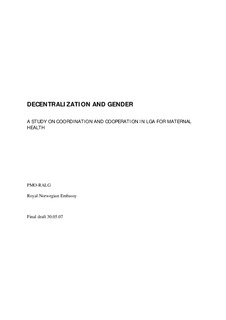| dc.description.abstract | Tanzania initiated the Local Government Reform Programme in 1996. The objective of the reform is decentralisation by devolution, and to strengthen local authorities' ability to deliver quality and accessible services in cooperation with local communities, civil society organisations, the private sector, and other development actors. This report describes various forms of coordination and cooperation in four districts, using maternal health as an entry point and example. Four districts with relatively low maternal mortality rates were selected: Ileje, Misungwi, Serengeti, and Moshi rural. The objective of the study is to identify if, and in what ways, these districts perform better than others when it comes to cooperation on maternal health, and to identify best practices and disseminate the practices to other districts. In the case of Moshi rural, the low MMR is first of all due to the high level of education of the inhabitants, the positive economic situation, women's income, and a large number of health facilities (partly established by missions, partly by self-help activities and wealthy individuals). These are all factors that are hard to replicate in districts that have less favourable socio-economic backgrounds. Ileje, Misungwi and Serengeti, on the other hand, are more interesting in terms of replication and learning. The three districts are all relatively poor, and the low maternal mortality rates are the result of specific area based donor funded projects and local initiatives targeting maternal health (as well, in the case of Ileje and Serengeti, mission hospitals). All the projects focusing on maternal health have similar characteristics: Vertical cooperation between health facilities and staff: regional, district and village Horizontal cooperation between health facilities, government and private Focus on voluntary village health workers and village health committees Focus on increasing delivery at health facilities and imp | |
